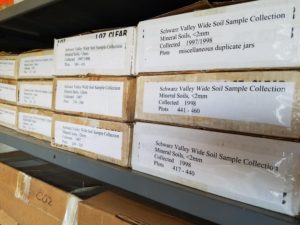A phalanx of open-science advocates (including Harvard Forest LTER’s Aaron Elison) recently published a Science Policy Forum full of broad principles and specific proposals on how the scientific community might cultivate a more open, transparent, and collaborative approach to data archiving and sharing. And they didn’t give anybody a pass on physical samples either.
The authors challenge field sciences, which they say “lag behind some laboratory sciences in making data and samples available to the broader research community,” to make a stronger commitment to data sharing. The factors that make data and sample sharing especially difficult for field sciences, where “where each study is temporally (and often spatially) unique,” say the authors–are exactly the reasons it is important to do so.They do not minimize the obstacles, noting that “transparency and reproducibility in scientific research require investment. Quality control is costly, and even large projects can have difficulty curating data to make them useful for others.” But they do call on funders, publishers, researchers and scientific societies to work at changing their perspectives and incentives.
The March 4, 2016 Policy Forum accompanied an editorial in the same issue in which Editor-in-Chief Marcia McNutt committed the Science family of journals to the Statement on Data Sharing in Public Health Emergencies.











